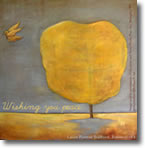The Advent Surprise
The Song of Mary: Magnificat
Luke 1:46-55
My soul doth magnify the Lord, *
and my spirit hath rejoiced in God my Savior.
For he hath regarded *
the lowliness of his handmaiden.
For behold from henceforth *
all generations shall call me blessed.
For he that is mighty hath magnified me, *
and holy is his Name.
And his mercy is on them that fear him *
throughout all generations.
He hath showed strength with his arm; *
he hath scattered the proud in the imagination of their hearts.
He hath put down the mighty from their seat, *
and hath exalted the humble and meek.
He hath filled the hungry with good things, *
and the rich he hath sent empty away.
He remembering his mercy hath holpen his servant Israel, *
as he promised to our forefathers,
Abraham and his seed for ever.
Glory to the Father, and to the Son, and to the Holy Spirit: *
as it was in the beginning, is now, and will be for ever. Amen.
The Book of Common Prayer, 1979
All year ’round, the Magnificat is part of the worship cycle of Morning and Evening Prayer offered in the Book of Common Prayer. You might say the Magnificat belongs to our common worship just as the Lord’s Prayer or any other element of common prayer belong to worship. But annually, at Advent, it takes on a special meaning for me, and when I sing or say it at that time of year, it isn't only that it seems to fit; it’s almost as if Advent were made for the Magnificat.
in the Book of Common Prayer. You might say the Magnificat belongs to our common worship just as the Lord’s Prayer or any other element of common prayer belong to worship. But annually, at Advent, it takes on a special meaning for me, and when I sing or say it at that time of year, it isn't only that it seems to fit; it’s almost as if Advent were made for the Magnificat.
Year by year I try to come to grips with the Magnificat’s depiction of everything in society being turned upside-down. Mary’s soul glorifies God because God has shown favor to the downtrodden, the low, the poor, by virtue of this coming incarnation—mystery above mysteries. Inevitably I go back to the very first chapter of the Gospel According to Luke, and there I read it in its context, its images fresh and startling: God has scattered the high and rich according to a promise made a long time ago.
As Luke’s context unspools itself, all the usual characters take their place on the stage of my imagination: Elizabeth and the one within who will one day be called John; Zechariah and his dramatic turn from mute to articulate prophet; fearful, gossiping neighbors. After all these have assembled, there’s usually the thought that this is nothing like Christmas—that it’s only something that can happen on the way to Christmas, something wonderfully odd that can only happen when we think we’re waiting for something else to occur.
The Magnificat is like that, too: a surprise of delight and reversed expectations hidden within a season of planning, rush, and anxiety.
Copyright ©2010 Torey Lightcap.
For an online version of the Book of Common Prayer, visit bcp online